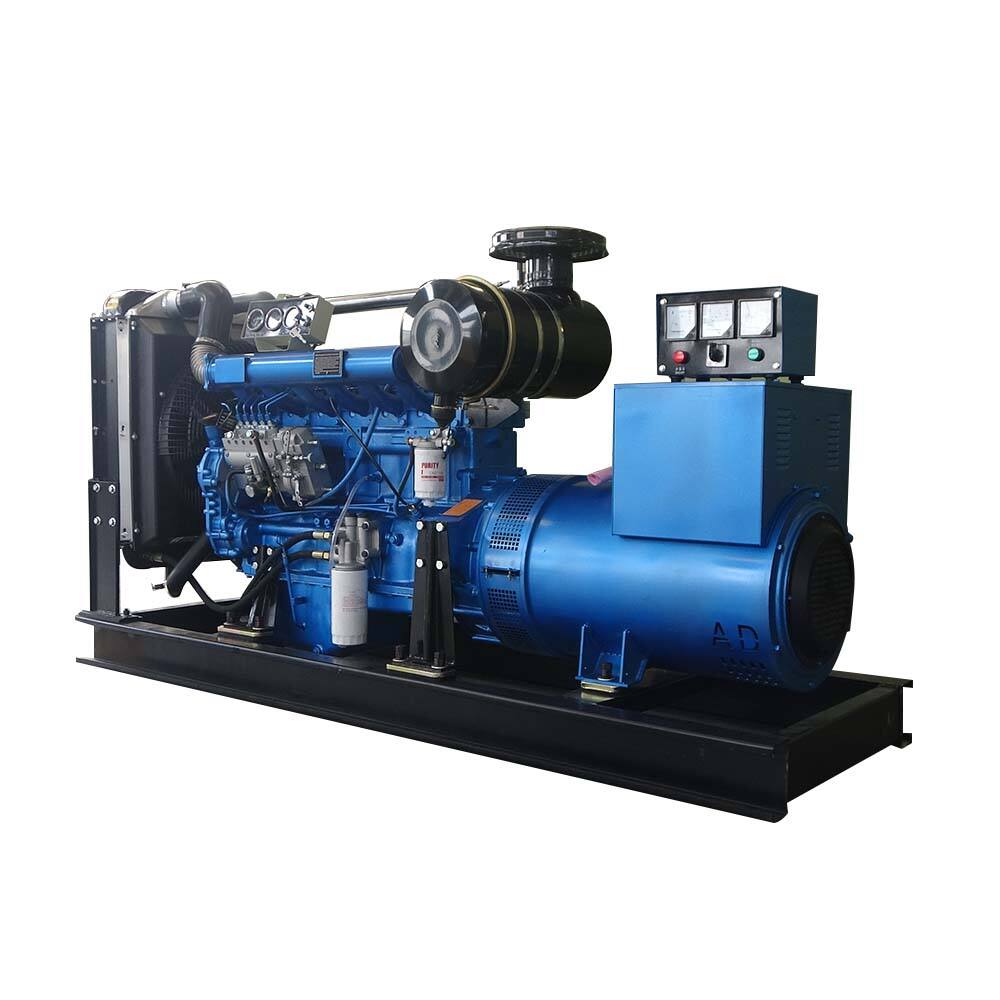Müasir Dizel Güc Həllərini Anlamaq
Ehtiyat elektrik enerjisi həllərinin peyzajı əhəmiyyətli dərəcədə inkişaf etmişdir və dizel elektrik generatorları etibarlı enerji təminatının ön sahəsində qalmaqdadır. Biznes fəaliyyətinizi qoruyarkən, kritik infrastrukturu qorumaqda və ya mənzil rahatlığını təmin etməkdə doğru dizel elektrik generatorunun seçilməsi bir neçə amilin diqqətlə nəzərdən keçirilməsini tələb edir. Bu ətraflı bələdçi sizə tələblərinizə tam uyğun gələn generatoru seçməyiniz üçün lazım olan bütün aspektləri izah edəcək.
Generatorun Seçilməsi üçün Əsas Nəzərdə Tutmalar
Güc çıxışı tələbləri
Dizel enerji generatorunun seçilməsinin əsası, güc ehtiyacınızın dəqiq müəyyənləşdirilməsindən ibarətdir. Eyni vaxtda işləməsi tələb olunan bütün avadanlıqların və cihazların ümumi vatlarını hesablayaraq başlayın. Bəzi avadanlıqlar işə düşən zaman əlavə enerji tələb etdiyindən, işləmə və işə salınma vattlarını daxil edin. Dəqiq bir enerji auditinin aparılması, generatorun gücünün yetərli olmaması kimi tipik səhvləri və potensial sistem arızasını qarşısını alır.
Sənaye tətbiqləri adətən 50kV-dan bir neçə meqavata qədər dizel enerji generatorları tələb edir, yaşayış məntəqələrində isə yalnız 10-30kV təchizatı kifayət edə bilər. Gələcək genişlənmə planlarınızı və mövsümi istehlak dəyişikliklərini nəzərə alaraq generatorunuzun pik yükləri dəşıya biləcəyinə əmin olun.
Yanacaq Səmərəliliyi və İstehlakı
Müasir dizel enerji generatorlarının dizaynı performansdan imtina etmədən yanacaq səmərəliliyinə üstünlük verir. İnkişaf etmiş yanacaq püskürmə sistemləri və yaxşılaşdırılmış mühərrik konstruksiyaları istehlak göstəricilərini köhnə modellərlə müqayisədə əhəmiyyətli dərəcədə azaltmışdır. Müxtəlif variantları qiymətləndirərkən, müxtəlif yüklərin şəraitində konkret yanacaq sərfiyyatını araşdırın.
Generatorun yük idarəetmə qabiliyyətini nəzərə alın, çünki optimal yüklənmə səviyyələrində (adətən nominal tutumun 75-85%-i) işləmə maksimal səmərəliliyi təmin edir. Bəzi yeni modellərdə tələbata əsasən mühərrik sürətini tənzimləyən ağıllı yük sensoru texnologiyası var ki, bu da yanacaqdan istifadəni daha da optimallaşdırır.

Texnik Speksifikasiya və Xüsusiyyətlər
Mühərrik Performansı və Etibarlılıq
Hər hansı dizel enerji generatorunun əsas hissəsi onun mühərrikidir. Aparıcı istehsalçılar ümumi rayon püskürmə sistemləri və turbosarj kimi inkişaf etmiş texnologiyaları tətbiq edərək performansı və etibarlılığı artırırlar. Nəzərdə tutulan istifadəniz üçün oxşar tətbiqlərdə və eyni ekoloji şəraitdə sübut edilmiş mühərrikləri axtarın.
Qərarınızı mühərrik ömrü, təmir növbələri və ehtiyat hissələrinin mövcudluğu təsir etməlidir. Premium generatorlarda uzun müddətli iş üçün nəzərdə tutulmuş mühərriklər olur və bəziləri əsas təmir tələb olunana qədər minlərcə saat davamlı şəkildə işləyə bilir.
İdarəetmə Sistemləri və Monitorinq
Müasir dizel enerji generator sistemləri rəqəmsal idarəetmə panelləri və monitorinq imkanları ilə təchiz edilmişdir. Rəqəmsal idarəetmə sistemləri real vaxtda performans məlumatları, nasazlıqların diaqnostikası və qabaqlayıcı təmir xəbərdarlıqları təqdim edir. Uzaqdan izləmə imkanları operatorların generatorun performansını istənilən yerdən izləməsinə və potensial problemlər haqqında bildiriş almağa imkan verir ki, bu da tez cavab verməyi təmin edir.
Gedəcə idarəedicilər avtomatik keçid kontaktoru, bir neçə generator arasında yük paylaşımı və proqramlaşdırıla bilən iş cədvəlləri kimi funksiyalar da təklif edir. Bu xüsusiyyətlər sistemin etibarlılığına və təmir idarəetməsinin sadələşdirilməsinə töhfə verir.
Çevrəvi və normativ uyğunluq
ايشيقليک نوردلاري
Dizel enerji generatorları üçün ekoloji qaydaları daha da sərtləşməyə davam edir. Müasir vahidlər ölçülərindən və təyinatından asılı olaraq müəyyən emissiya standartlarını yerinə yetirməlidir. Şimali Amerikada bir çox tətbiqlər üçün Tier 4 Final tələblərinə riayət etmək məcburidir, Avropa bazarları isə EU Mərhələ V qaydalarına əməl edirlər.
İstehsalçılar dizel hissəcik filtrləri və seçici katalitik reduksiya texnologiyası daxil olmaqla, yanacaq sistemlərinin tullantılarını azaldan innovasiyalarla reaksiya veriblər. Generator seçərkən regionalarınız üçün mövcud və gələcəkdə gözlənilən emissiya tələblərini təmin etdiyinə və ya onları üstələdiyinə əmin olun.
Səs Səviyyəsi Qaydaları
Səs emissiyası məhdudiyyətləri yerləşdiyi yerdən və təyinatından asılı olaraq dəyişir. Bir çox şəhər əraziləri, xüsusilə yaşayış məntəqələri üçün ciddi səs məhdudiyyətlərini tətbiq edir. Müasir dizel enerji generatorlarının dizaynında akustik örtüklər, izolyasiya dayaqları və xəstəxana səviyyəli səssizləşdiricilər daxil olmaqla, inkişaf etmiş səs zəiflətmə xüsusiyyətləri nəzərdə tutulub.
Seçimləri qiymətləndirərkən müxtəlif yüklər və məsafələrdə generatorun səs səviyyəsini nəzərə alın. Bəzi istehsalçılar səsə həssas tətbiqlər üçün xüsusi olaraq hazırlanmış super sakit versiyalar təklif edirlər.
Quraşdırılma və İdarəetmə Nöqtələri
Sahə Tələbləri
Düzgün quraşdırma planlaşdırılması, generatorun optimal iş performansını və təhlükəsizlik qaydalarına uyğunluğu təmin edir. Kifayət qədər havalandırma, yanacaq saxlama tələbləri və təmir üçün əlçatmamlıq kimi amilləri nəzərə alın. Quraşdırma yerinin generatorun ölçülərinə uyğun olması və soyutma və servis üçün kifayət qədər boşluğa malik olmasına imkan verməlidir.
Fundament tələbləri, hava şəraitindən qorunma və təhlükəsizlik tədbirləri quraşdırmadan əvvəl planlaşdırılmalıdır. Yerli qaydalardan asılı olaraq, bəzi dizel elektrik generatorlarının quraşdırılması xüsusi icazələr və ya ətraf mühitin təsiri üzrə qiymətləndirmə tələb edə bilər.
Təmir Proqramları
Generatorın etibarlı işləməsini təmin etmək və ömrünü maksimum dərəcədə uzatmaq üçün müntəzəm texniki baxım həyati əhəmiyyət daşıyır. İstehsalçının tövsiyə etdiyi texniki baxım cədvəlini və əlaqədar xərcləri qiymətləndirin. Bəzi təchizatçılar, müntəzəm texniki baxımı, təcili dəstəyi və ehtiyat hissələrin dəyişdirilməsini özündə birləşdirən komypleks xidmət razılaşmaları təklif edir.
Sizin ərazinizdə kvalifikasiyalı xidmət texniki kadrlarının və orijinal ehtiyat hissələrinin mövcudluğunu nəzərə alın. Ən yaxşı dizel enerji generatoru qədər onun texniki xidmət dəstəyi şəbəkəsi də yaxşıdır.
TEZ TEZ VERİLƏN SORĞULAR
Təsisatım üçün nə qədər gücə malik dizel enerji generatoru lazımdır?
Uyğun ölçü, davamlı yükü və işə salınma ehtiyaclarını daxil olmaqla, ümumi enerji tələbatınıza bağlıdır. Detallı enerji auditindən keçin və gələcək inkişaf üçün 20-25% tutum rezervi əlavə edin. Peşəkar yük hesablama xidmətləri tətbiqiniz üçün lazım olan dəqiq ölçünü müəyyənləşdirməyə kömək edə bilər.
Dizel enerji generatoru nə qədər uzun müddət davamı ilə işləyə bilər?
Müasir dizel enerji generatorları, yanacaq deposunun həcmindən və yük şəraitindən asılı olaraq, tək bir doldurma ilə ardıcıl olaraq 8-72 saat işləyə bilir. Düzgün texniki baxım və kifayət qədər yanacaq təchizatı ilə bəzi generatorlar həftələr və ya aylar boyu fasiləsiz işləyə bilir, lakin müntəzəm texniki baxım intervallarına riayət edilməlidir.
Dizel enerji generatorunun gözlənilən ömrü nə qədərdir?
Düzgün baxım ilə keyfiyyətli dizel enerji generatoru 15-20 il və ya daha çox işləyə bilər. Həqiqi ömür istifadə şəraiti, baxım keyfiyyəti və iş şəraitindən asılıdır. Müntəzəm xidmət və vaxtında aparılan təmir işləri generatorun ömrünü əhəmiyyətli dərəcədə uzadır.
Dizel enerji generatoru nə qədər tezliklə xidmət edilməlidir?
Əsas texniki baxım hər 200-300 iş saatından sonra və ya illik olaraq, hansı birinci gəlirsə, həyata keçirilməlidir. Bununla yanaşı, yağın dəyişdirilməsi, filtrlərin əvəz edilməsi və ümumi yoxlamalar da daxildir. Əsas təmir intervalları istehsalçının tövsiyələrindən və istifadə xüsusiyyətlərindən asılı olaraq adətən hər 12.000-15.000 saatdan sonra baş verir.
